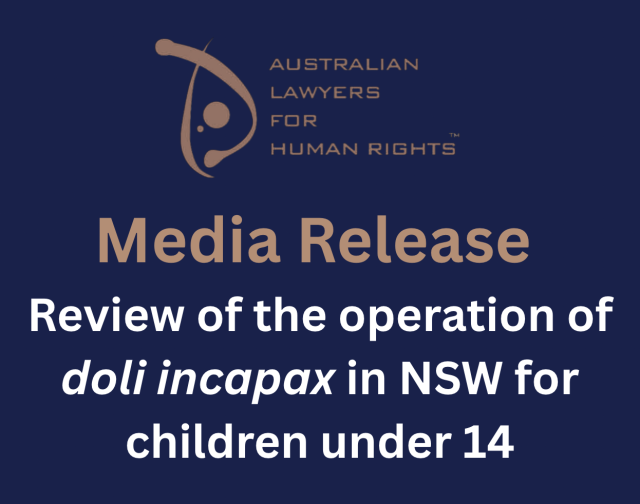Doli Incapax Review Recommendations deliver NSW Premier a clear message: do not weaken evidence-based child rights protections.

Australian Lawyers for Human Rights (ALHR) welcomes recommendations released on Saturday following the NSW Government’s Review of the operation of doli incapax in NSW for children under 14.
Doli incapax is a common law presumption that a child under the age of 14 years lacks the capacity to be criminally responsible for their acts. Despite this common law principle, under NSW legislation the minimum age of criminal responsibility is 10 years, meaning children in primary school can still be policed, criminalised and detained. The common law presumption of doli incapax is therefore a vital safeguard that must be preserved unless and until NSW raises the minimum age of criminal responsibility to 14 years.
The Review makes 7 recommendations, including that the common law test for rebutting the presumption of doli incapax be codified in legislation, that police receive additional training on the operation of doli incapax and that the government act to address constraints in access to diversion for children aged between 10 and 13. ALHR made a submission to the Review, which was cited numerous times by the reviewers.
ALHR’s submission to the Review is available here
ALHR Vice President and Chair of Children’s Rights Kerry Weste said, “We urge the Minns Government to accept the resounding message delivered by this Review – instead of exposing a child to the criminal justice process, diverting them from that process, and engaging them in diversion processes or therapeutic interventions, provides a more constructive and cost-effective approach.
NSW has one of the lowest ages of criminal responsibility in the world, well below the global median of 14 years, and entirely out of step with medical science. The UN Committee on the Rights of the Child consistently calls upon Australia to raise the minimum age of responsibility to accord with international obligations [1]. This call has been echoed repeatedly throughout the UN human rights system, including by the UN Human Rights Council, the UN Human Rights Committee, the UN Committee on the Elimination of Racial Discrimination, and the UN Special Rapporteur on the Rights of Indigenous Peoples [2].
ALHR calls on the NSW Government to ensure that all stakeholders and experts are comprehensively consulted on draft legislation to codify doli incapax. This is especially important for Aboriginal and Torres Strait Islander children and children with disabilities in NSW who currently experience acute intersectional disadvantage and systemic discrimination leading to massive overrepresentation in the criminal justice system.
Further, children themselves have an internationally recognised human right to be consulted and to have their views taken seriously on matters that impact them. The NSW Government must consult with young people and their peak bodies in order to ensure that any changes to the law in NSW are consistent with their human rights.
Any weakening of the presumption of doli incapax would take NSW even further away from Australia’s international children’s rights obligations and accepted science on child development. This must be avoided at all costs.
ALHR urges the NSW Premier Chris Minns to listen to the chorus of experts who have consistently put forward evidence-based approaches that, if implemented, will protect both our communities and very young children from harm.”
Contact: ALHR Media Manager, Julie Connolly: sydney@jcp.com.au M:+ 61 418 470 203
[1] See eg: UN Committee on the Rights of the Child, Concluding Observations on the Combined Fifth and Sixth Periodic Reports of Australia, UN Doc CRC/C/AUS/CO/5-6 (1 November 2019) at [48(a)] (‘the Committee urges the State party to bring its child justice system fully into line with the Convention and … raise the minimum age of criminal responsibility to an internationally accepted level and make it conform with the upper age of 14 years, at which doli incapax applies’); UN Committee on the Rights of the Child, Consideration of Reports Submitted by States Parties under Article 44 of the Convention, Concluding Observations: Australia, UN Doc CRC/C/AUS/CO/4 (28 August 2012) at [84(a)]; and UN Committee on the Rights of the Child, Consideration of Reports Submitted by States Parties under Article 44 of the Convention, Concluding observations: Australia, UN Doc CRC/C/15/Add.268 (20 October 2005) at [74(a)].
[2] Eg, UN Human Rights Council, Report of the Working Group on the Universal Periodic Review, Australia, UN Doc A/HRC/47/8 (24 March 2021), Recommendation 146.140 at [146]. United Nations Human Rights Committee, Concluding Observations on the Sixth Periodic Report of Australia, UN Doc CCPR/C/AUS/CO/6 (1 December 2017) at [44]. UN Committee on the Elimination of Racial Discrimination, Concluding Observations on the Eighteenth to Twentieth Periodic Reports of Australia, UN Doc CERD/C/AUS/CO/18-20 (26 December 2017) at [26]. UN Human Rights Council, Report of the Special Rapporteur on the Rights of Indigenous Peoples on Her Visit to Australia, 36th sess, UN Doc A/HRC/36/46/Add.2 (8 August 2017).



